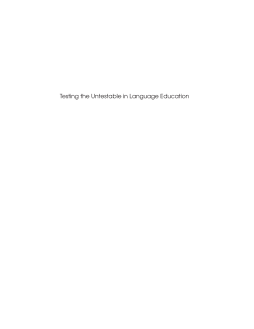
Additional Information
Book Details
Abstract
The testing and assessment of language competence continues to be a much debated issue in foreign language teaching and research. This book is the first one to address the testing of four important dimensions of foreign language education which have been left largely unconsidered: learner autonomy, intercultural competence, literature and literary competence, and the integration of content and language learning. Each area is considered through a theoretical framework, followed by two empirical studies, raising questions of importance to all language teachers: How can one test literary competence? Can intercultural competence be measured? What about the integrated assessment of content-and-language in CLIL and teaching? Is progress in autonomous learning skill gaugeable? The book constitutes essential reading for anyone interested in the testing and assessment of seemingly largely untestable aspects of foreign language competence.
The title of this book is well chosen. Despite the apparent oxymoron, this collection of papers succeeds in addressing important issues of educational policy and theory with the precision born of empirical work combined with discussion of principles. This book will open new options for testers, for teachers and for those who make policy decisions.
Amos Paran is Senior Lecturer at the Institute of Education, University of London, where he is Programme Leader of the MA TESOL. He has a special interest in masterâ??s level teaching by distance learning, and has also been involved in testing projects in a variety of different languages. His main research interests are reading in a foreign language, literature in language teaching, and distance education.
Lies Sercu is an Associate Professor of Linguistics at the University of Leuven. Her research interests concern the promotion of intercultural competence through foreign language education as well as SLA vocabulary acquisition from reading and writing texts in a foreign language. She has been involved in the development of language tests and blended learning environments for the professionalisation of language teachers. She has widely published in major international journals on intercultural competence and foreign vocabulary acquisition.
The book brings together double sets of constructs which represent in their own right whole areas of academic investigation. Each section provides both theoretical underpinning and empirical studies which in turn offer a wide array of pedagogical initiatives and alleyways to explore. As such, it makes a very valuable contribution to the understanding of each dimension while providing pragmatic guidelines for practitioners interested in rising to the challenge of developing meaningful testing procedures. Christine Penman, School of Marketing, Tourism & Languages, Edinburgh Napier University, UK in Language and Intercultural Communication
Table of Contents
| Section Title | Page | Action | Price |
|---|---|---|---|
| Contents | v | ||
| Contributors | vii | ||
| Chapter 1 More than Language: The Additional Faces of Testing and Assessment in Language Learning and Teaching | 1 | ||
| Part 1 Intercultural Competence | 15 | ||
| Chapter 2 Assessing Intercultural Competence: More Questions than Answers | 17 | ||
| Chapter 3 Interculturally Savvy or Not? Developing and Assessing Intercultural Competence in the Context of Learning for Business | 35 | ||
| Chapter 4 Eliciting the Intercultural in Foreign Language Education at School | 52 | ||
| Part 2 Autonomy | 75 | ||
| Chapter 5 Measuring Autonomy: Should We Put Our Ability to the Test? | 77 | ||
| Chapter 6 Assessment of Autonomy or Assessment for Autonomy? Evaluating Learner Autonomy for Formative Purposes | 98 | ||
| Chapter 7 Learners Reflecting on Learning: Evaluation versus Testing in Autonomous Language Learning | 120 | ||
| Part 3 Literature | 141 | ||
| Chapter 8 Between Scylla and Charybdis: The Dilemmas of Testing Language and Literature | 143 | ||
| Chapter 9 Crossing the Bridge from Appreciative Reader to Reflective Writer: The Assessment of Creative Process | 165 | ||
| Chapter 10 The Taming of the Immeasurable: An Empirical Assessment of Language Awareness | 191 | ||
| Part 4 Language and Content | 215 | ||
| Chapter 11 Assessing Language and Content: A Functional Perspective | 217 | ||
| Chapter 12 Teachers and Texts: Judging What English Language Learners Know From What They Say | 241 | ||
| Chapter 13 Towards Systematic and Sustained Formative Assessment of Causal Explanations in Oral Interactions | 256 |
